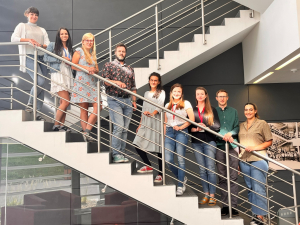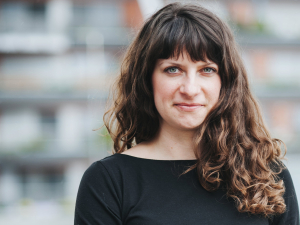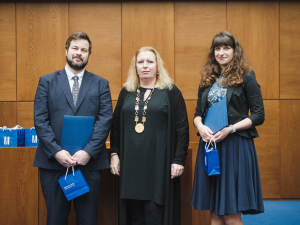#WomenInScience: Positive role models are key to success
As a child she wanted to be a medical doctor, today she researches the properties of the immune system. At the ICRC, she is part of Dr Jan Frič’s research team on Cellular and Molecular Immunoregulation. In December 2022, she was awarded the MU Vice-Rector’s Award for Excellence in Doctoral Studies, and she also supervises undergraduate students, manages projects and organises activities within the Young Immunologists Group of the Czech Immunological Society. Now Petra Lázničková is now facing a new “project”, to combine her scientific career with motherhood. As she says herself, it is about the set-up of our environment and conditions in which we function. On the occasion of the International Day of Women and Girls in Science, commemorated every year on 11 February, we asked Petra to share her experience.
Photo: Petra Lázničková
Biochemistry as a space for connecting the dots
What was your path to science?
When I was a child, I wanted to be a medical doctor, but eventually I was tempted by biochemistry. I discovered that I didn’t like to learn things by heart. I prefer to try to understand the principles and context. I came to Brno from the Podkrkonoší region, as my brother was already studying here, and I also liked the atmosphere of the city. I completed my Bachelor’s and Master’s degree in biochemistry at Masaryk University, and then I had to decide what to do next. I was considering whether I had all the qualities needed for pursuing a PhD.
How did you evaluate your chances then?
The key is to think analytically. There are a number of scientific journals out there. When you are looking for a particular thing, you need to be able to pick out what is relevant to you from that mass of information and whether your hypothesis can be methodically tested. So I decided to do an Erasmus+ Traineeship for recent graduates first, to try out all aspects of day-to-day scientific work. I joined Professor Kamil Krance’s group at the Centre for Regenerative Medicine in Edinburgh, Scotland. His focus on haematology fitted well with my experience of studying neutrophils, one of the types of white blood cells that provide natural immunity. I spent a total of 8 months on placement in Scotland and found that I enjoyed the process – designing an experiment, conducting it, then evaluating it and finding context in the literature. Even before returning from Scotland, I met with Dr. Frič with whom I agreed on the realization of my doctorate within his team.
What specifically are you working on?
We look at the immune system, its function and signalling in terms of pathologies, i.e. specific disorders. As part of my PhD, I studied the immune system profile of children and adolescents who have successfully undergone treatment for neuroblastoma, which is a typical early childhood tumour arising from nervous tissue cells. The cooperation with Tomáš Kepák, MD, who has been working on the issue of late consequences of cancer treatment in childhood for a long time, was crucial for us.
What did you find out?
There are a number of articles on the study of immune cells in leukaemia survivors. This disease is more common than, say, neuroblastoma, and therefore the patient groups for research are broader. Paediatric leukaemia patients have been shown to carry some immune damage throughout their lives. They show premature onset of disorders that are otherwise common in elderly patients, such as heart and breathing problems or frequent infections. We have found scope for our research in patients with neuroblastomas, which are solid tumours, where similar features of immunity have not been so well explored. Surprisingly, we found that although the immunity in these patients shows signs of aging early after treatment, within about 4 years after therapy, later the cellular properties return to normal values. This gives hope for the same prospects for cured patients. However, the question is whether other problems would show up later, e.g. in the generation of thirty-somethings. We would therefore like to extend our research to other age groups.
A busy day for a researcher
What does your typical day look like?
During my PhD, I planned my own experiments, worked on the components one by one and consulted the procedure with my supervisor. I am now a post-doc, so I typically start my day by dealing with emails. I then work on my own experiments or work with a fellow technician on the flow of the sub-experiments she is conducting for the project. Since I also supervise ICRC Academy students, one undergraduate thesis, and am advisor to a beginning PhD student, I have dedicated time for their experiments and questions as well. Together as a team, we then process the results of our experiments and prepare papers for publication in scientific journals. Unfortunately, we do not have the capacity to be able to process samples from thousands of patients. However, we are trying to go more in-depth and test the functions of cells so that our research has a specific purpose and meaningful value.
In addition to your research activities, you are also active within the Czech Immunological Society, what does it entail?
I helped founding the Young Immunologists Group in June 2021. We created everything ourselves from scratch, i.e. the name, logo and related administration. We organize lectures, workshops and online seminars for (not only) young researchers in the field. But we also deal with more informal topics such as work-life balance or experiences from internships abroad. I myself have been surprised by the response to our activities. At the same time, it has been a great experience for me. I couldn’t have imagined how much time it would take to organise a lecture, to find researchers who would have a big reach and attract the audience, to make and send out invitations or to find sponsors. It’s a really diverse activity.
Photo: In December 2022, MU Vice-Rector Šárka Pospíšilová awarded the Award for Excellence in Doctoral Studies at MU to 33 graduates and their supervisors, including Dr. Jan Frič and Petra Lázničková
You mentioned work-life balance – how do you manage your free time? How do you spend your time outside the lab?
I try not to live only by science, also because if there was some obstacle and one had no compensation by another activity, it would destroy one’s whole world. My husband also helps me, reminding me that it’s time to rest. I like to hike in the mountains, in the countryside and play sports. I cycle, ski and cross-country ski, depending on the season.
How has Covid-19 influenced you?
The immune system has been the subject of a variety of science communication activities thanks to the covid era. It has, I think, improved awareness of what immunity is. But I was worried at first, probably like everyone. It was something unknown. And there was a lot of speculation. My relatives and friends kept asking me for my expert opinions and recommendations, which was not easy. I didn’t want to get into analysing unfounded assumptions.
In terms of research, I managed to get involved in a number of projects. Most recently, as part of the National Recovery Plan (Exceles programme), we will be comparing the immune system in post-covid patients who have returned to normal life and those who have developed post-covid syndrome. So from that point of view, I see coronavirus as an opportunity to contribute to research. Moreover, in the early days of the pandemic, a number of publications flowed from the regions with the first outbreaks and appeared in prestigious scientific journals because they needed to gain the necessary reach. However, it now appears that not all the published findings met the requirements for research quality, and it will be up to us scientists once again to rectify this situation and find out what is relevant.
Women in science do not benefit from the set-up of the education system
How do you feel as a woman in science?
In this respect, a lot depends on who you meet. I feel rather supported in my community. Moreover, I feel that there are currently many young female scientists. The other thing is that, as they progress in their careers, their numbers are declining because they want to have a family and they have to adjust the time they spend on their work.
You’re facing a similar milestone in your career because you’re expecting a baby soon. What would make it easier for you to continue your scientific work?
I am fortunate that Dr. Frič understands this shift in life and considers it natural. We’ve agreed on an arrangement so that work doesn’t come at the expense of my family time. After an initial “offline” period where I will be fully committed to the baby, I have the option of working part-time or from home. Incidentally, my colleague has spent the last almost 5 years this way and it certainly hasn’t taken her out of research. At the same time, I feel a commitment to the students I supervise, so I will be dedicated to them as well, so that they can present their results as part of their studies.
According to the data from the National Contact Centre – Gender and Science 2022, the proportion of women in science in the country is 27 % and the representation decreases with each level of study and level of scientific function. What are the gender-related pitfalls of a career in science?
Czech scientific society is set up in such a way that after a PhD one should gain experience abroad as a post-doc. This can be beneficial in terms of experience, but it clashes with the time when, for example, my female peers are already starting families. If I can compare it to the UK, they have much more freedom there to complete the individual education levels more quickly. For example, instead of the 3+2 model, the undergraduate degree can be combined into four years of Bachelor’s studies. Then you can go straight on to a PhD, which can take as little as 3 years to complete. This opens up the possibility to still gain further international experience in time. In our country, one of the options is to do a PhD abroad and then return. This will account for the time spent abroad and you can then, for example, apply for certain grants for which this experience is a prerequisite.
How competitive is the scientific world?
A lot. To stay in science, at some point you need to become independent and move from post-doctoral researcher to junior team leader. To make that shift, you need to find your own scientific field of expertise and your own source of funding.
That seems like a very unstable environment, how do you feel about it?
You’re right, it’s a very unstable environment. It is only at a later stage that scientists can get permanent positions at some institutions. This already guarantees a certain stability, where the institution keeps the scientist, even if sometimes only part-time. The way I see it, without grants, we wouldn’t exist. So I myself have been actively involved in grant writing since I was a PhD student to help our research.
Diversity and positive role models move people forward in their careers.
What is the gender ratio in your team?
We defy the statistics a bit because we only have three men and seven women. At the same time, I see a representation of different experiences, mindsets, skills and hobbies, which moves us forward. I have mentored four female students – three in the ICRC Academy and another one now in her undergraduate degree. I remember when resumes came in from the ICRC Academy, most of the candidates were women. So you can see that women have that energy in them, but unfortunately it does not last for everyone, in the long run.

Photo: Cellular and Molecular Immunoregulation Research Team
Do the results of your research affect your lifestyle in any way?
In immunology, there is a lot of talk about the effect of lifestyle on the ageing body or the immune system, whether it is dietary habits, smoking, alcohol consumption or physical activity. I’ve been active since I was a kid, so it’s more about affirming that the direction my parents led me in is the right one.
Do you follow fashion trends? Do you keep up with them?
I don’t follow fashion trends much, but I often solve practical problems. I’m quite tall, so it’s hard for me to find a dress of the right length, for example. This has led me to slow-fashion, where I see that the material is of good quality, sewn by, for example, a mother on maternity leave, or by established domestic brands. I don’t need to buy a lot of stuff, but rather invest in fewer quality pieces.
What are your future plans?
I would like to stay in science for as long as possible. A lot of my colleagues are leaving for companies after post-doc. I’ve never really been drawn to the commercial world. I’m slowly evolving on my journey. At first, I wasn’t sure whether to go for a PhD, which I successfully completed. Then I wasn’t sure if I could manage leading people as a post-doc, and now I see, it’s okay. Maybe it’s also about building confidence. Personally and professionally, I’ve had positive feedback from my students and colleagues about working together, which makes me happy.
Do you feel supported in your further development?
During my PhD, my supervisor had regular meetings with me to discuss current research-related issues. He always ended these meetings with such an optimistic tone that it was almost contagious. Even if a particular thing didn’t turn out the way we imagined, I was still motivated and the idea that I didn’t have to crumble from every problem remained. So that’s what I take away from our collaboration. Furthermore, for example, I participated in a leadership course for several days within the ICRC, so I have those opportunities here as well.
What message would you give to young girls and women considering a career as a scientist?
If a woman feels that science could be fulfilling for her, there is always a way. She just needs to find the right mentors to support her. They can be male or female, it’s their qualities that matter. I admire people who do their work well, regardless of gender.
Thank you for the interview.
Gender equality and diversity are some of our core values at the ICRC. We have been a granted the “HR Excellence in Research” award since 2021 and have been implementing the Gender Equality Plan since 2022. As a result, we are gradually succeeding in setting up equal opportunities among male/female employees so that they have the opportunity to make the most of their talents, skills and expertise in science and research.
We focus on several key thematic areas – Institutional arrangements for gender equality policy, Personnel policy, Salary policy, Reconciliation of personal and professional life, Organisation culture and workplace relations. For example, we routinely offer part-time work and subscribe to the principles of transparency and fairness in gender pay. We are one of the first employers to have undergone an equal pay analysis using the LOGIB tool, and we are also the very first representative from among hospitals in the country.
We employ women in both scientific and administrative positions. It is not a secret that our head is also a woman, Prof. Irena Rektorová. Out of a total of 406 employees, 55% are women. Specifically, we have 40% female researchers in relation to male researchers. Other female colleagues work in scientific support positions such as clinical study coordinators, data analysts and laboratory technicians.
More information can be found at: https://www.fnusa-icrc.org/en/career/equal-opportunities/



